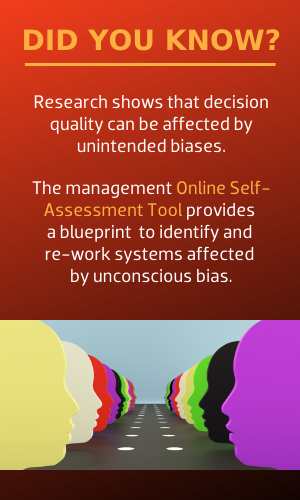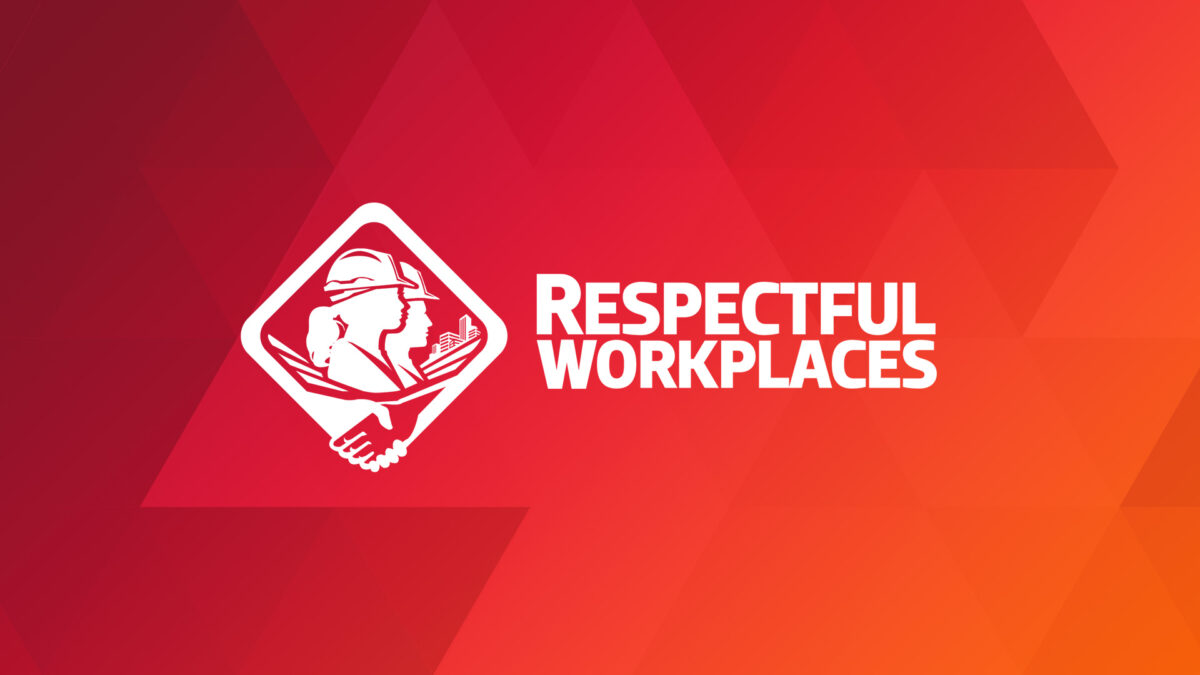Does your organization ensure that its goals to be fair and equal are not compromised by bias?

Recent incidents around the world have brought the treatment of Black, Indigenous, and People of Colour to the foreground. These incidences of racism have raised questions not only about why Black, Indigenous, and People of Colour continue to experience overt racism, but also why they experience, on average, lower levels of employment, including lower wages and lower career attainments, which can also lead to social impacts such as higher rates of homelessness and incarceration.
These questions around racism have caused organizations to ask, “Is there more that we can do?”
No sector of the economy is free of racism and discrimination, and many individuals are unaware that their beliefs and behaviour toward Black, Indigenous, and People of Colour are racist or discriminatory. Regardless of intent, however, the behaviour of some individuals and societal structures, including workplace policies and processes, can be embedded with racial bias that unintentionally excludes or prevents Black, Indigenous and People of Colour from accessing opportunities. This is systemic racism.
Most leaders and managers do not intend to discriminate or exclude any worker from opportunities. In fact, leaders and managers generally want to have organizations that are based on merit, where the best potential and performance of workers are being tapped. However, the intent to create fair and equal organizations is not always matched by the outcome.
What is creating this gap between intent and impact? The answer is unconscious or unintentional bias. It compromises the quality of decision-making by interfering with our best intentions to be fair and equal. And in its most extreme form, it undermines the construction industry’s efforts to diversify the workforce and increase the participation of Black, Indigenous, and People of Colour in the industry’s labour force.
Bias is an inclination or preference formed without reasonable justification that can prevent judgement from being balanced or fair. We are exposed to incredible amounts of information from multiple sources and our conscious brain cannot make sense of all of that information in a way that makes normal living possible, which leads us to use mental shortcuts. These shortcuts primarily involve categorizing people, things, experiences, etc. that allow us to make quick decisions. We assess new situations and people against the categories already stored in our unconscious mind.
Furthermore, these biases do not remain in our minds; we act on them. We use these shortcuts to help us make decisions. Research has shown that our biases unintentionally get built into the systems we develop, such as recruitment and promotion, resulting in system-wide or systemic bias. When that bias concerns race, it becomes systemic racism. Without efforts to improve the quality of decision-making by reducing the impact of unconscious bias in all of its systems, an organization will have difficulty in meeting its goals to be diverse and inclusive.
Organizations around the world that are leading the way on addressing systemic racism are using proven practices for creating respectful and inclusive organizations. This involves awareness, training, and efforts to create or re-work systems that reduce the opportunities for bias to interfere in decision-making.
Creating an organization that is inclusive of Black, Indigenous, and People of Colour is a win-win for everyone. Workers in inclusive organizations report higher levels of engagement and retention. Research shows that younger generations working for employers perceived to have a diverse workforce are more likely to want to stay five or more years (69%) than those who say their companies are not diverse (27%).
Not surprisingly, inclusive organizations tend to outperform their competitors. The global consulting firm, McKinsey, found that organizations ranking in the top 25% of their industry based on the gender and race/ethnicity diversity in their leadership are more likely to have financial returns above their national industry medians.
Organizations that are seeking to do more to identify how systemic racism may be affecting Black, Indigenous, and People of Colour will be rewarded. It will help them to improve the quality of their decision-making and ensure their organization is based on merit, where the best potential and performance are being tapped.
The BuildForce Respectful Workplace Online Toolkit provides three tools based on the proven practices of respectful and inclusive organizations: an Online Self-Assessment Tool, a Policy Framework and Implementation Guide, and the online course, “Working in a Respectful and Inclusive Workplace.”
The management Self-Assessment Tool provides a blueprint to identify and re-work systems affected by unconscious bias.
Also look for the new BuildForce online course, to be released in the new year, to help leaders and managers to understand systemic racism. BuildForce is also developing a new module for the “Working in a Respectful and Inclusive Workplace” course to help workers develop awareness about systemic racism, also to be released in the new year.
For more info:
- Deloitte. 2018 Deloitte Millennial Survey. See www2.deloitte.com/content/dam/Deloitte/global/Documents/About-Deloitte/gx-2018-millennial-survey-report.pdf.
- Donovan, Mason and Mark Kaplan. The Inclusion Dividend, 2nd Ed. DG Press, New Hampshire, U.S., 2019.
- McKinsey. “Why Diversity Matters.” January 2015. See: www.mckinsey.com/business-functions/organization/our-insights/why-diversity-matters.
- Soll, Jack B., Katherine L. Milkman and John W. Payne. “Outsmart Your Own Biases.” Harvard Business Review, May 2015.
Read from the beginning. Click here to start at Part 1.
What can an effective Respectful and Inclusive Workplace Program deliver?
- Become an employer of choice – attract, retain, and advance top talent from all sources of labour
- Unlock collaboration and innovation – create high-performing teams through diversity of thought and experience
- Build your brand – your organization will gain a competitive edge as a leader and innovator
Get started today!
The BuildForce Canada Online Respectful and Inclusive Workplace Toolkit includes:
- the Respectful Workplace Online Self-Assessment Tool to assist organization leadership in assessing their current situation and identifying where they may need to make changes
- the Respectful Workplace Policy Framework and Implementation Guide to assist organizations in creating and implementing a policy that supports a respectful and inclusive workplace
- the Respectful Workplace Online Training Course to train workers on how to create and support a respectful and inclusive workplace
- the online course Introduction to Understanding Systemic Racism: A Guide for Leaders and Managers
All the resources you need to create and support a respectful and inclusive workplace!

Respectful and Inclusive Workplaces
